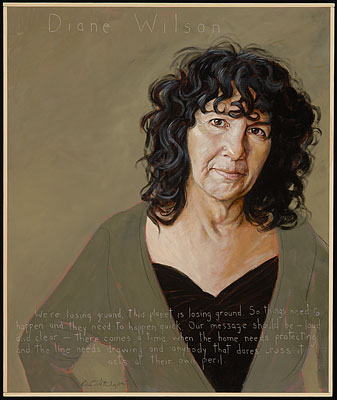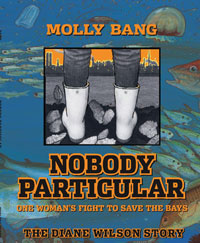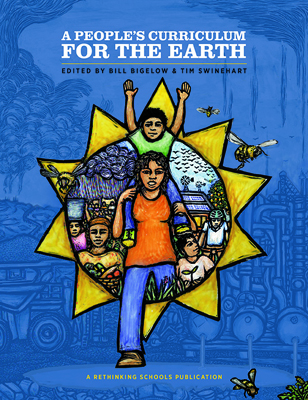The following biography of Diane Wilson is from the Americans Who Tell the Truth website, which features this painting/poster and many more by artist Robert Shetterly.
“We’re losing ground. This planet is losing ground. So things need to happen and they need to happen quick. Our message should be — loud and clear — there comes a time when the home needs protecting and the line needs drawing and anybody that dares cross it acts at their own peril.”
Fourth-generation shrimper Diane Wilson had no idea how her life would change when she called a meeting in 1989 to discuss how expanding a plastics manufacturing plant might affect the environment in her coastal Texas county. She just wanted honest discussion of things anyone who lived in Calhoun County would care about: the impact of a Formosa Plastics expansion on the health of the people who lived there and on the livelihood of those who fished the bay.
Wilson couldn’t know that her dog would be shot in her yard, she would become a pariah in her own community, and someone would attempt to sink her boat — with her on it. She couldn’t know that she, with just a high-school diploma and a dislike of chemistry, would become conversant in chemical compounds and their health risks, file her own legal briefs, and learn more about corruption of public officials than anyone wants to believe. She couldn’t imagine that what she was starting was a new life path that would fortify her sense of purpose and draw international networks of support. As Wilson writes in her 2005 book, An Unreasonable Woman, “Risking one’s life can be strangely liberating.”
 The expansion got a green light despite Wilson’s campaign. After a lot more work and four hunger strikes, she persuaded Formosa Plastics to sign a zero-discharge agreement — and then neighboring Alcoa to sign one of its own. Visiting India, she came home and went after another neighbor, Dow Chemical, which had bought Union Carbide after its massively lethal, Bhopal chemical spill in 1984. Wilson pressed the company to make fair reparations to Bhopal families.
The expansion got a green light despite Wilson’s campaign. After a lot more work and four hunger strikes, she persuaded Formosa Plastics to sign a zero-discharge agreement — and then neighboring Alcoa to sign one of its own. Visiting India, she came home and went after another neighbor, Dow Chemical, which had bought Union Carbide after its massively lethal, Bhopal chemical spill in 1984. Wilson pressed the company to make fair reparations to Bhopal families.
When Wilson told her story at the 2001 Bioneers Conference of environmental activists and scientists, she challenged listeners to become “unreasonable” in their defense of the Earth. A new group, Unreasonable Women for the Earth, immediately formed, and Wilson says members in eight countries supported her hunger strike against Dow. She co-founded another network of women activists, Code Pink for Peace, in 2002.
In December 2005, Wilson began serving a four-month jail sentence for civil criminal trespass when she chained herself to a Dow Chemical tower in August 2002. The jail term opened a new chapter in her activism, as she advocated for better conditions for other women imprisoned in the Victoria County jail.
She comments: “I believe at some time in everyone’s lifetime, they will receive a piece of information and what they do with that information will determine the rest of their lives. No excuses are allowed. Not that they don’t have the money. Or they don’t have an organization already up and running on the ground to support the issue. Or no one will help and the town doesn’t like it and you have no one to babysit the kids. No excuses. Either you don’t or you do and sometimes all that doing requires is picking up a phone and calling a meeting. Then trust that life or the universe or Gaia will step in and your life will become a fantastic roller coaster ride. That’s what happened to me.”
Related Resources
-
- Nobody Particular Acclaimed graphic artist Molly Bang brings Diane Wilson’s story to life in striking pictures. A vivid companion to An Unreasonable Woman.
- Gulf Coast Fisherwoman “Disrupts the Peace” at BP Shareholder Meeting Democracy Now! Interview in April, 2011.
- Texan Environmental Activist Diane Wilson: Why I Refuse to go Jail Democracy Now! Interview in October, 2005.










Twitter
Google plus
LinkedIn